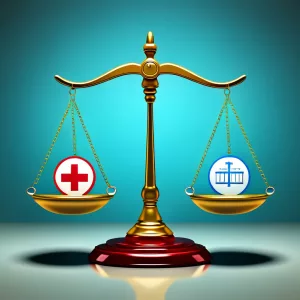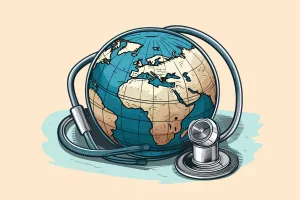South Africa’s 2025/26 Health Department budget is a bold plan to improve healthcare for everyone. It focuses on building new hospitals, hiring thousands of doctors and health workers, and using smart technology to plan better services. The government aims to make healthcare fair and easy to access, no matter where people live or how much money they have. Big efforts will also continue to fight HIV/AIDS and tuberculosis with new treatments and steady support. This budget brings hope for a healthier, stronger South Africa.
In South Africa, there is a big debate about how to change healthcare for the better. One idea is the National Health Insurance (NHI) plan, which aims to give everyone access to healthcare through a governmentrun system. However, some people worry it might take too long and be hard to put into action. On the other side, the Universal Healthcare Access Coalition (UHAC) suggests a different path with a dual system, mixing tax funding and insurance to make sure everyone gets care without waiting years. This plan focuses on helping the poorest while allowing those who can pay to contribute, all while making local healthcare more responsive to people’s needs.
South Africa has introduced the National Health Insurance (NHI) Bill, a revolutionary healthcare initiative aimed at eliminating inequalities in healthcare access based on social and economic status. The NHI proposes a holistic strategy that consolidates different financial resources to guarantee quality healthcare accessibility to all South Africans. The implementation of the NHI will be gradual, with critical milestones earmarked for each phase, and it serves as a crucial instrument to combat poverty and represents a step towards abolishing a biased healthcare system.
AfriForum, a civil rights entity, has urged South African President Cyril Ramaphosa to review the National Health Insurance (NHI) Act due to concerns over potential negative repercussions on the country’s healthcare system. AfriForum has stated its willingness to join opposition parties in a collective judicial movement against the act if it is enacted. The NHI bill has faced opposition from AfriForum and is being inspected for potential infringement of constitutional rights.
South Africa’s National Health Insurance (NHI) aims to provide comprehensive healthcare services to all citizens without financial stress. The innovative approach to funding will level the disparity between private and public sectors. The NHI also seeks to transform the pharmaceutical sector, improve quality, and address disparities. Despite facing challenges, the NHI is a significant juncture for South Africa as it moves towards making healthcare a common asset for all citizens.
In a momentous decision, South African parliamentarians voted in favor of the National Health Insurance (NHI) bill, which seeks to provide comprehensive healthcare for all citizens. However, critics remain concerned about the feasibility and sustainability of universal health care in the country.
South Africa has recently passed the National Health Insurance (NHI) Bill, a significant healthcare policy reform that has been in progress since the adoption of the White Paper on NHI in 2017. The main objective of this reform is to establish a more accessible, affordable, and equitable healthcare system for all citizens.
South Africa’s healthcare system is set to undergo a significant transformation with the National Health Insurance (NHI) Bill nearing implementation. The Bill aims to provide equitable access to quality health services to all South Africans, regardless of their socioeconomic status or geographic location.
South Africa is on the brink of achieving Universal Health Coverage with the National Health Insurance (NHI) Bill. The Ministry of Health, led by Dr. Joe Phaahla and Dr. Sibongiseni Dhlomo, will participate in a critical debate scheduled for the 13th of June. The aim is for the NHI Bill to be adopted and passed, and for all South Africans to have access to quality healthcare irrespective of their socioeconomic status or geographic location.
President Cyril Ramaphosa recently addressed the 2nd Presidential Health Summit at the Birchwood Hotel in Boksburg, Gauteng, reflecting on the Presidential Health Compact signed four years ago. The summit brought together stakeholders from various sectors to develop short and longterm solutions to challenges facing South Africa’s healthcare system.
The South African public health sector is currently facing a crisis that impacts everyone, particularly the most vulnerable members of society. Doctors are overwhelmed by the patient loads, lack of support and backup, and the need to work extended hours. Consequently, healthcare quality has deteriorated, and the poor and vulnerable bear the brunt of the situation. Nevertheless, amidst the challenges, there are also stories of hope and resilience that deserve recognition.











